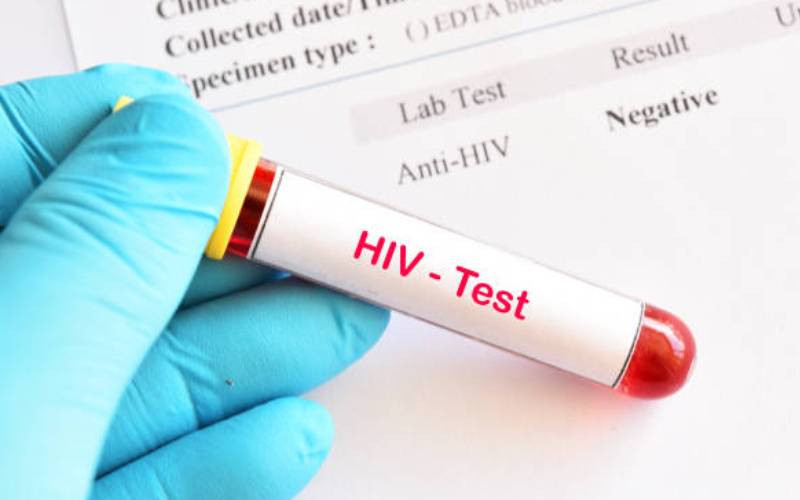
She became ill and watched her husband die of HIV as she prepared for her own death at the turn of the Millennium.
When Brenda*, 87, was diagnosed with HIV in 2001, her only wish to her family was not to be buried in a polythene bag as witnessed during Covid-19 pandemic.
"I saw death knocking," recalls Brenda from Matopeni area of Kayole, Nairobi. "I called my children and asked them not to dump my body when I died."
Patients then were not allowed to share spoons, plates, and cups and most died lonely deaths after being isolated by their families.
"I did not die," narrates Brenda, her face wrinkled by infectious laughter. "God has been gracious to me. I witnessed a lot of people die of HIV, a killer disease."
HIV, a viral disease, is transmitted through unsafe sex, blood transmission, and mother-to-child through breastfeeding and birth.
Brenda says her hubby had multiple sexual relationships and she didn't expect to live long after developing sores. Her body grew weaker too.
"I lost a lot of weight and there was no treatment," recalls the mother of nine who was put on Antiretroviral (ARV) Therapy treatment in 2003.
- HIV gains at risk as donors cut lifeline support
- Why 'disco matanga' is to blame for high HIV prevalence
- Health Ministry launches registration for Nairobi Half Marathon ahead of World AIDS day
- Fighting in silence: The untold stories of learners and teachers living with HIV
Keep Reading
Nearly 21 years on, Brenda is among the eldest patients on HIV treatment and whose lives have improved due to improvement in diagnosis and treatment.
When Brenda was diagnosed only the rich could afford treatment but today "I collect ARVs at no fee. I take ARVs like 'beans' as they have prolonged my life."
ARVs are also vital in prevention of mother-to-child transmission besides suppressing viral load from sustained use.
Apart from treatment, Brenda is a member of Matopeni People Living with HIV and AIDs (Mapilwa), which has helped her manage her mental health.
"Not all HIV patients adhere to treatment," says Brenda. "Taking ARVs like njugu is not an easy thing and we encourage patients to form groups to learn about side effects of treatment and laughing together impacts on my psychology,"
Malipwa was established in 2008. It has 80 members aged 45 and 87 years and Brenda says elderly members have challenges managing chronic conditions like diabetes, cancer, and hypertension.
They also suffer financial constraints as the majority cannot get employed over advanced ages and have low immune systems.
"Poverty is a major challenge as some default on drugs because of lack of food," says Brenda.
One member, Beatrice, 58, is among HIV patients with cancer of the cervix.
"It is a toll order to treat HIV and cancer. But even when admitted, I have to take ARVs," narrates Beatrice who closed down her business as stigma saw customers fearing she could transmit the virus through touch.
The mother of three was nicknamed 'Mama wa Vinonda' (mother of sores) and "nobody was willing to associate with me. Whenever I bought tomatoes, they were wrapped in a polythene bag, as traders feared I could transmit the virus to them."
Due to stigma, the collection of ARVs at hospitals was also secretive and saw many not adhering to treatment leading to deaths, says Beatrice.
Rose Njoki, who was diagnosed with HIV and TB in 2002 after her husband's death, also says back then "there was no counseling, yet HIV was like walking with death on your head. Victims were carried like babies to bask in the sun."
To avoid stigma in Nairobi, Njoki traveled to Kerugoya, Kirinyaga County for treatment and a doctor encouraged her to avoid stress, eat a balanced diet, and adhere to medication which she says is "my secret to healthy living" despite having hypertension and diabetes.
Dr Ruth Masha, CEO National Syndemic Diseases Control Council (NSDC) said the elderly are a special category of patients because despite managing the viral load, they ail from age-related diseases like hypertension and diabetes, and "the ministry is engaging the elderly, to ensure they manage their viral load and boost their immune system."
 The Standard Group Plc is a multi-media organization with investments in media
platforms spanning newspaper print
operations, television, radio broadcasting, digital and online services. The
Standard Group is recognized as a
leading multi-media house in Kenya with a key influence in matters of national
and international interest.
The Standard Group Plc is a multi-media organization with investments in media
platforms spanning newspaper print
operations, television, radio broadcasting, digital and online services. The
Standard Group is recognized as a
leading multi-media house in Kenya with a key influence in matters of national
and international interest.











